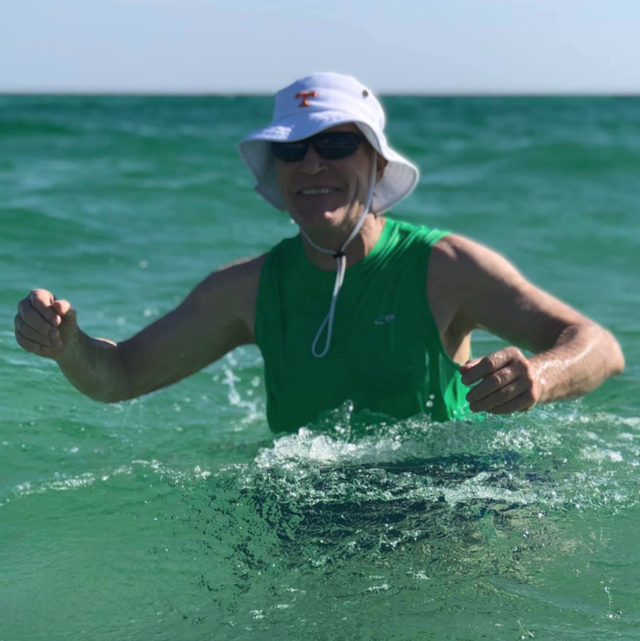- Dave Bennett of Tennessee died this week after being infected with Vibrio vulnificus, a flesh-eating bacteria, during a trip to Florida.
- Bennett’s daughter, Cheryl Bennett Wiygul, wrote in a lengthy Facebook post that her father had cancer and his immune system was compromised.
- Doctors explain what you should know about flesh-eating bacteria, the risks, and how to stay safe in the water.
A Tennessee man died this week less than 48 hours after being infected with a flesh-eating bacteria during a trip to Florida.
Dave Bennett’s daughter, Cheryl Bennett Wiygul, wrote in a lengthy Facebook post that her father died from Vibrio vulnificus. “Flesh eating bacteria sounds like an urban legend. Let me assure you that it is not. It took my Dad’s life. This is so raw and personal to me that I did not want to post about it, but if I can help one person, then it is worth it,” she wrote.
Wiygul said that she had heard of a similar case nearby where a 12-year-old girl contracted bacteria that turned into necrotizing fasciitis, but said that there should be more awareness of flesh-eating bacteria.
Bennett had cancer and his immune system was compromised, and Wiygul said she was “fanatical” about protecting him. “I feel like I should have known and that is something I will live with for the rest of my life,” she said. Because Bennett suffered from cancer, he was more susceptible to flesh-eating bacteria, she said, but he had “been in the water several times so it didn’t seem like a risk.”
Wiygul said that her parents had a great time during their vacation and that her dad was “happy and talkative, seemed to feel fine as he did all week,” on Friday night. “About 4:00 a.m. Saturday morning, 12 hours after we were in the water, he woke up with a fever, chills and some cramping.”
He developed pain in his legs, was “extremely uncomfortable” and had a “terribly swollen black spot on his back,” Wiygul said. Bennett was hospitalized and put on IV antibiotics but more black spots appeared on his skin. By Sunday, he had died.
“There were no bacteria warnings at any beach or park we went to,” Wiygul wrote. “They do post advisories for high bacteria but there were none. I would never have taken my Dad in the water if there was a bacteria advisory but it would have been because I didn’t want him to get a stomach virus not because I thought it would kill him.”
What is Vibrio vulnificus bacteria?
Vibrio bacteria naturally live in certain coastal waters and are found in higher concentrations between May and October when water temperatures are warmer, according to the Centers for Disease Control and Prevention (CDC). Many Vibrio species can cause human illness, including Vibrio vulnificus. Vibrio causes about 80,000 illnesses and 100 deaths in the U.S. each year, the CDC says.
Vibrio vulnificus can develop into necrotizing fasciitis, a rare bacterial infection that spreads very quickly. However, Group A strep bacteria most commonly cause the illness, per the CDC.
What are the symptoms of this flesh-eating bacteria?
Vibrio bacteria can cause watery diarrhea, nausea, vomiting, fever, and chills, usually within 24 hours after it’s ingested, the CDC says. It can also cause a skin infection when an open wound is exposed to it and, in people with a compromised immune system, it can be serious and even deadly.
“Pain is very very important,” says William Schaffner, MD, an infectious disease specialist and professor at the Vanderbilt University School of Medicine. “Usually these infections are beneath the skin. They don’t show very much on the surface but they’re painful beyond what you would expect looking at them.”
How common is it for flesh-eating bacteria to move this fast?
It’s unfortunately common, says infectious disease expert Amesh A. Adalja, MD, senior scholar at the John’s Hopkins Center for Health Security. “Most cases of flesh-eating bacteria are a relentless spread,” he says. “That’s why time is so critical in recognizing these and getting people treated. You can leave a patient for an hour and see the progression.”
And again, having a compromised immune system makes someone particularly vulnerable. “Chemotherapy treatments might see something progress more dramatically than it would in ordinary circumstances,” Dr. Adalja says.
How do people actually die from flesh-eating bacteria?
The infection moves quickly and it can actually progress to sepsis, a life-threatening complication of an infection, Dr. Adalja says. At that point, a person’s organs may begin to fail.
What can you do to prevent these bacterial infections?
There have been several stories about flesh-eating bacteria in the news lately, and it’s understandably scary. Still, Dr. Adalja says it’s important to keep this in mind: “These types of infections are extremely rare. They don’t occur as frequently as people mistakenly believe.”
“All of us are at risk,” Dr. Schaffner adds. “The majority of cases occur in perfectly normal people, but it’s rare. Hundreds of thousands of people go swimming each year but there are very, very very few cases of flesh-eating bacteria in comparison.”
However, you can be smart about going in the water. If you have a compromised immune system, it’s a good idea to talk to your doctor in advance to make sure you’re cleared for swimming. It’s also important to check local water advisories to see if there are any warnings about bacteria in the water. If they’re there, steer clear.
If you have a cut or open wound, be especially mindful about going in the water. “If you have a bandage on a part of your body, it’s probably good to avoid going swimming and enjoy watching everyone else,” says Dr. Schaffner.
If you happen to get a cut while you’re in the water, wash it well with soap and water afterward, Dr. Adalja says. And, if you develop a cut that feels painful or hot, or you develop a fever and chills, seek medical attention immediately.
“There is not enough education out there about the bacteria in the water,” Wiygul wrote. “I love the water and so did my Dad. People do need to know how to be more cautious and how to recognize symptoms. There is information out there but I didn’t find it all until it was too late. I don’t want this to happen to anyone else.”













